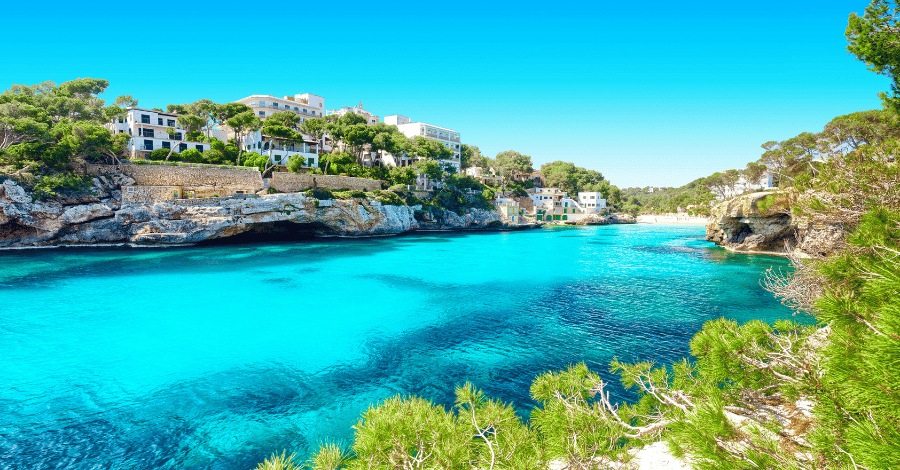Spain is one of the most sought-after locations in Europe for an exciting relocation after retirement. With its warm climate, affordable cost of living, beautiful architecture, and modern lifestyles, the country offers many attractive perks most retirees look for.
If you want to know how to retire in Spain from the US, you must consider the pros and cons and the most up-to-date facts and figures about the visa application process, as well as the best places to live as an expat. In this guide, we list everything you need to know if you’re thinking about retiring in Spain.
Retiring in Spain pros and cons
There are multiple benefits such as plenty of sunshine and a laid-back lifestyle waiting for you as a retiree. While no country is perfect, for many, the benefits of moving to Spain outweigh the cons. Let’s explore:
The pros of retiring to Spain
1. Low cost of living
The cost of living in Spain is quite affordable compared to other places in Europe. Big cities in Spain, such as Madrid and Barcelona, are much cheaper when compared to their counterparts like London, New York, Paris or Los Angeles.
2. Safety
Spain is one of the safest countries in the world. There isn’t a major threat of violence and crimes in the country, and expats typically feel very safe.
3. Excellent healthcare
One of the most noteworthy benefits of retiring in Spain from the USA is access to quality healthcare. This is one of the top reasons why retirees flock to Spain. Spain’s healthcare system is ranked as the world’s seventh-best system. In addition, private medical care in Spain is affordable, it costs between €45 and €200 (or $50 to $220 per month), which is significantly less than in the United States.
4. Good public transportation
Spain offers reliable public transportation in most areas, including buses and subways. Even outside of the major cities such as Barcelona and Madrid, you can find a solid transport system.
5. World-class cuisine
Spain is home to distinctive and flavorful foods. Delectable dishes and treats are made with unique flavor profiles and infused with a variety of spices.
6. Simple options in real estate
Purchasing a home in Spain is relatively simple if you want to retire in Spain from the USA. The government actually encourages it. Spain can be a much more affordable place to buy a home than other parts of Europe.

The downside of retiring to Spain
1. The work culture
The work environment in Spain isn’t terrible by most measures, but it could use some improvement. Spanish workers typically put in more than 40 hours per week and do not always take two days off per week. People are expected to work hard, and they may work longer hours than they spend with friends or family.
2. Language barrier
If you don’t speak Spanish, moving to Spain may present some language challenges. However, it is relatively simple to navigate the country and communicate with the locals given that the majority of the younger generation speaks multiple languages, including English.
3. Problems with bureaucracy
Despite the laid-back nature of Spain’s government and its people, there are still problems with bureaucracy. Anyone considering moving to Spain should learn more about how the country manages its policies and government, and prepare for some challenges.
Documents required to retire in Spain
As your first step, it’s important to find out how to apply for legal residence in Spain. As a retiree, you can apply for a Spanish non-lucrative visa and residency permit, but you have to show that you can support yourself without work and meet other basic requirements.
You can also apply for the “Golden Visa” if you have the money to invest locally. In Spain, you have to invest a minimum of €500,000 in Spanish real estate to qualify for this visa.
If you want to apply for a residence visa as a retiree, also known as a Spain retirement visa, you’ll need to provide the following documents:
- Your passport
- Your application document
- Two passport-size photographs
- Proof of how much money you have, as well as your regular income
- Proof of private medical insurance
- A medical certificate
- A clean criminal background
Private medical insurance for expats is not only mandatory for your visa application, but also smart to have. There are great options on the market, but the number one insurance company in Spain to offer comprehensive insurance for expats is Adeslas. In addition to medical coverage, they also offer dental, accident, pet, home and business insurance coverage. Monthly rates for medical insurance range from €65 to €199, but if you sign up for expat medical insurance through this link, you will benefit from a special discount of up to 32%.
The price of the visa application will vary depending on where you’re from. Once you’ve submitted your application, you typically find out whether or not you’ve been successful within two to six weeks. But it can take as long as three months.
Best places to retire in Spain
There are two factors to consider when determining the best place to retire in Spain: your preferences for a certain lifestyle and your budget. When choosing a place to live, lifestyle considerations include whether you want to stay along the coast, in one of Spain’s many small towns, or in one of the country’s major cities. Let’s explore some of the best places to retire in Spain:
1. Madrid
- Monthly cost of living without housing: $770 per person
- Average house price: $790,000
- Population: 6,800,000

Madrid, the largest city in the country and capital of Spain, is often the first option for cosmopolitans who enjoy city life. With over a million foreign residents, Madrid is a popular and easy place to move to. The city offers incredible an art scene, sightseeing spots and world class dining options for expat retirees. Madrid is often described as Spain’s most elegant city, thanks to its stunning boulevards, beautiful buildings and expansive parks.
2. Granada
- Monthly cost of living without housing: $680 per person
- Average house price: $400,000
- Population: 230,000

This city is seen as the romantic heart of Moorish Spain. It has a lot of culture, with flamenco music playing in bars and restaurants and a fairy-tale-like ambience. Set against a backdrop of the extraordinary Sierra Nevada Mountains, skiing is also just a short drive away. Granada is a great option for couples that enjoy a relaxed lifestyle but also like to seek adventure every now and then.
3. Valencia
- Monthly cost of living without housing: $700 per person
- Average house price: $406,600
- Population: 2,500,000

Valencia, Spain’s third-largest city, is well-known for its pleasant climate and more laid-back lifestyle. However, that does not imply that the city is boring. Beaches, festivals, food, parks, and sports playgrounds are just some of Valencia’s many attractions. It’s a great affordable option for retirees who enjoy living in a large city.
4. Barcelona
- Monthly cost of living without housing: $700 per person
- Average house price: $814,000
- Population: 5,500,000

One of the safest cities in the world, Barcelona also has great weather, delicious Catalan food, a lot of art museums, a lively nightlife, outdoor exercise areas, and a thriving expat community. Brits, Germans, and Americans alike move to Barcelona to take advantage of its high standard of living and laid-back atmosphere. The city has more than 179 nationalities and is ranked as the 29th best city for expats in 2021.
5. Costa del Sol
- Monthly cost of living without housing: $800 per person
- Average house price in Andalucia: $373,200
- Population: 1,400,000

Malaga and Marbella, along the province of Andalusia’s southern Mediterranean coast, are popular destinations for expats, particularly Brits and Europeans. A lot of people speak English here, making it a great place to settle for expats. Cost of living and property is slightly more expensive in Costa de Sol compared to other parts of Spain.
6. Mallorca Island
- Monthly cost of living without housing: $770 per person
- Average house price: 741,200
- Population: 900,000

Mallorca and its rapidly expanding expat community can be found in the Balearic Islands, which are frequently cited as one of the best places to retire. Cala Lliteras, Cala Dor, Canyamel Pins, and Sa Rapita are other scenic destinations, but Palma, also known as Majorca, is frequently referred to as the best city. It also leads the way in home prices. Some of the most amazing features of this island include breathtaking scenery, stunning stretches of coastline, excellent nightlife, a glamorous shopping scene, and a thriving real estate market.
7. Alicante
- Monthly cost of living without housing: $680 per person
- Average house price: $328,000
- Population: 330,000

One of the most popular regions to retire in Spain for expats is Costa Blanca, a beautiful 200 mile coastline with beautiful beaches and towns on the Mediterranean coast. Alicante is one of the largest cities in the area, a great retirement destination with an affordable cost of living and tons of attractive features for expats: wide sandy beaches, lots of sunshine, and a lively food and entertainment scene.
Find your new home in Spain
Whether you’re seeking a Mediterranean climate, mountainous area, or urban lifestyle, Spain has a lot of great villages, towns and cities where you can live in your golden years. It’s possible to have an amazing retirement in Spain if you do thorough research, collect the right documents and find a place that matches your lifestyle.
Last but not least, don’t forget to learn Spanish to have a fun-filled and comfortable retirement in Spain! This will allow you to fully engage in your new community.
This article contains affiliate links. If you purchase via one of these links, we may earn a commission.


